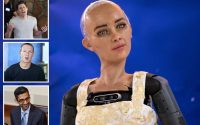George RR Martin, John Grisham among famous authors suing ChatGPT creator for copyright infringement
Best-selling authors George R.R. Martin, Jodi Picoult and John Grisham are part of a group that slapped OpenAI with a lawsuit, alleging the company built its popular ChatGPT tool in part by using their books without permission.
Filed by the Authors Guild and some of its most prominent members, the lawsuit alleges that OpenAI has “trained” the so-called “large language models” that power its chatbot with their “copyrighted works” – a move the plaintiffs described as “systemic theft on a mass scale.”
The authors claim that OpenAI’s products threaten their livelihood by allowing anyone to create “derivative works” or “material that is based on, mimics, summarizes, or paraphrases Plaintiffs’ works, and harms the market for them.”
“In short, the success and profitability of OpenAI are predicated on mass copyright infringement without a word of permission from or a nickel of compensation to copyright owners, including plaintiffs here,” the complaint added. “OpenAI knows it; its investors know it; and plaintiffs know it.”

The lawsuit filed in New York federal court on Tuesday is one of the most high-profile examples to date of mounting concern that ChatGPT and other AI models could damage creative fields – or even render them obsolete.
The dispute over AI-generated content is central to the lengthy strike by writers, producers and actors that brought Hollywood to a standstill in recent months.
Other prominent writers who joined the lawsuit include Elin Hilderbrand and Jonathan Franzen.
The lawsuit noted that OpenAI has “admitted” in public filings that it trained its models on “large, publicly available datasets that include copyrighted works.”

OpenAI has not said which specific literary works have been fed into its models.
The plaintiffs claim that ChatGPT responds to user prompts using material it could not have generated unless it had “read” the authors’ books.
In the case of Martin’s works, the suit alleges that ChatGPT was able to generate accurate summaries of several of his books, including “A Game of Thrones,” “A Clash of Kings” and “A Storm of Swords,” the first three books in his popular “A Song of Ice and Fire” fantasy series that was later adapted into the hit HBO show.
Additionally, ChatGPT has generated its own versions of Martin’s two unfinished books that will conclude the series, “The Winds of Winter” and “A Dream Of Spring” and even produced an accurate outline for a fake prequel novel using his characters, according to the complaint

“ChatGPT could not have generated the results described above if OpenAI’s LLMs had not ingested and been ‘trained’ on the Martin Infringed Works,” the suit says.
ChatGPT provides a similar confession when asked on whether it was trained on copyrighted works, according to a response quoted in the court documents.
“It is possible that some of the books used to train me were under copyright,” the chatbot said. “However, my training data is sourced from various publicly available sources on the internet, and it is likely that some of the books included in my training dataset were not authorized to be used.”


When reached for comment, an OpenAI spokesperson said the firm “respect the rights of writers and authors, and believe they should benefit from AI technology.”
“We’re having productive conversations with many creators around the world, including the Authors Guild, and have been working cooperatively to understand and discuss their concerns about AI,” the spokesperson said in a statement.
“We’re optimistic we will continue to find mutually beneficial ways to work together to help people utilize new technology in a rich content ecosystem,” the statement added.


